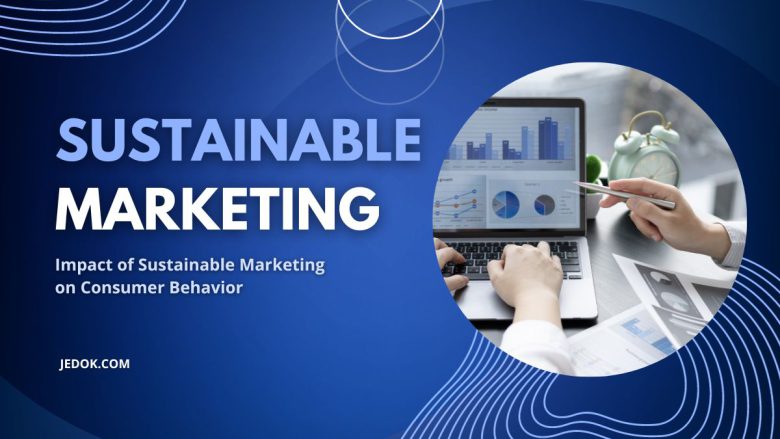
Sustainable marketing has a profound and transformative impact on consumer geste in the moment’s world. As consumers become increasingly apprehensive of environmental and social issues, they seek products and brands that align with their values. Sustainable marketing plays a vital part in shaping consumer preferences, choices, and copping opinions. In this disquisition, we will claw into the colorful ways sustainable marketing influences consumer geste, from driving conscious consumption to fostering brand fidelity.
1. Fostering Conscious Consumption:
Sustainable marketing has a significant influence on promoting conscious consumption among consumers. Through transparent communication and education, sustainable marketing informs consumers about the environmental and social impact of their choices. This increased mindfulness encourages consumers to make further aware opinions about the products they buy and the brands they support.
For case, when a brand highlights its commitment to using sustainable accouterments or reducing carbon emigrations in its marketing juggernauts, consumers are more likely to consider the environmental counteraccusations of their purchases. This shift in mindset leads to conscious choices, similar to concluding for products with minimum packaging or products made from recycled accouterments. Sustainable marketing empowers consumers to consider the long-term consequences of their consumption patterns, eventually contributing to a more sustainable and responsible society.
also, sustainable marketing frequently emphasizes the significance of reducing waste and extending product lifecycles. Brands that promote order, continuity, and product life inspire consumers to invest in particulars that are erected to last, reducing the need for frequent reserves and minimizing waste generation. This shift towards conscious consumption aligns with sustainability pretensions and encourages consumers to value quality over volume.
2. Building Trust and Credibility:
One of the core impacts of sustainable marketing on consumer geste is the establishment of trust and credibility. Consumers are decreasingly skeptical about greenwashing — brands making false or inflated sustainability claims. Sustainable marketing addresses this dubitation by promoting transparent and authentic sustainability sweats, which in turn builds trust with consumers.
When consumers perceive a brand’s sustainability messaging as genuine and backed by concrete conduct, they’re more likely to trust that brand. Trust is an abecedarian motorist of consumer geste, impacting purchase opinions and brand fidelity. Sustainable marketing ensures that the pledges made in marketing juggernauts align with a brand’s factual practices and values, buttressing trust in the brand.
also, believable sustainable marketing juggernauts frequently include third-party instruments and empirical data to substantiate their claims. These rudiments further enhance trust by furnishing consumers with concrete substantiation of a brand’s commitment to sustainability. This trust, formerly established, can have a continuing impact on consumer geste, as consumers are more inclined to choose and remain pious to brands they trust.
3. Influencing Purchase Decisions:
Sustainable marketing has a direct influence on consumer purchase opinions. As consumers prioritize sustainability and ethical considerations, brands that laboriously engage in sustainable marketing are more likely to be chosen over challengers who neglect these aspects. Sustainable marketing strategies can impact consumers at colorful stages of the decision-making process.
At the mindfulness stage, sustainable marketing introduces consumers to a brand’s sustainability enterprise and values. Consumers who reverberate with these sweats are more likely to consider the brand as a feasible option when making copping opinions. For illustration, a consumer seeking-friendly apparel is more likely to explore a brand that prominently features sustainable practices in its marketing accouterments.
During the consideration stage, sustainable marketing provides consumers with information that helps them estimate their options. This information may include details about ethical sourcing, or its positive impact on communities. Consumers are more likely to favor brands that offer transparent and comprehensive information about their products and practices.
At the decision stage, sustainable marketing can act as the tilting point that convinces consumers to choose one brand over another. A compelling sustainability story, a clear commitment to environmental and social responsibility, or a well-executed cause-related marketing crusade can sway consumers’ final opinions. Brands that effectively communicate their sustainability sweats frequently enjoy a competitive advantage in the business.
4. Encouraging Brand Loyalty:
Sustainable marketing plays a vital part in fostering brand fidelity among consumers. When consumers identify with a brand’s sustainability values and perceive it as authentically committed to environmental and social causes, they’re more likely to become repeat guests. This fidelity stems from an emotional connection to the brand’s values and a desire to support a brand that aligns with their own beliefs.
Sustainable marketing strategies frequently prioritize client engagement and involvement in sustainability enterprises. Brands that encourage consumers to share in environmental or social systems, give feedback, or partake in their own sustainability stories foster a sense of community and involvement. This sense of participation strengthens the emotional connection between consumers and the brand.
also, brands that laboriously engage in sustainable marketing inspire consumer fidelity by constantly delivering on their sustainability pledges. When consumers see a brand’s ongoing fidelity to ethical practices and values, they’re more likely to remain pious over the long term. Sustainable marketing reinforces this commitment and encourages consumers to become lawyers for the brand, driving fidelity further.
5. Shaping Brand Perceptions:
Sustainable marketing profoundly shapes consumers’ comprehension of brands. Brands that prioritize sustainability in their marketing juggernauts are perceived as responsible, ethical, and forward-allowing. These positive comprehensions impact how consumers view and interact with the brand across colorful touchpoints.
For illustration, a brand that laboriously promotes its carbon-neutral shipping practices and showcases its renewable energy sources is perceived as environmentally responsible. Consumers associate similar brands with environmental stewardship and are more likely to support them. This perception can extend to all aspects of the brand, impacting how consumers view its products, services, and overall charge.
Sustainable marketing also shapes brand personality and identity. Brands that emphasize sustainability frequently convey attributes similar to empathy, social responsibility, and invention. Consumers who reverberate with these attributes are more likely to develop a strong emotional connection with the brand, viewing it as a reflection of their values and beliefs.
6. Driving Advocacy and Word-of-Mouth Marketing:
Sustainable marketing encourages consumers to come lawyers for the brand, leading to word-of-mouth marketing and organic growth. When consumers are authentically passionate about a brand’s sustainability sweats, they’re more likely to partake in their positive gests with musketeers, family, and on social media.
Sustainable marketing juggernauts that inspire consumers to share in environmental or social enterprise turn consumers into active actors in the brand’s trip. This sense of power and involvement leads to a desire to promote and defend the brand to others. lawyers frequently partake in their stories, guests, and recommendations, leading to increased brand visibility and credibility.
also, word-of-mouth marketing driven by sustainable advocacy is largely trusted by consumers. Recommendations from musketeers, family, or peers who have had positive guests with a sustainable brand carry significant weight. This form of marketing extends the brand’s reach and influence, frequently performing in the accession of new guests who trust the recommendations of their network.
7. Encouraging Ethical Supply Chain Considerations:
Sustainable marketing also influences consumer geste by encouraging ethical force chain considerations. Brands that laboriously promote fair labor practices, ethical sourcing, and responsible products frequently educate consumers about the significance of these factors.
Consumers who are exposed to sustainable marketing juggernauts are more likely to prioritize products that are immorally produced and sourced. They seek out brands that demonstrate a commitment to fair stipends, safe working conditions, and responsible sourcing of accouterments. This shift in consumer geste encourages brands to borrow ethical force chain practices to meet the demand for transparent and socially responsible products.
In conclusion, sustainable marketing has a multifaceted impact on consumer geste, ranging from promoting conscious consumption to fostering brand fidelity and advocacy. As consumers decreasingly prioritize sustainability and social responsibility in their choices, brands that laboriously engage in sustainable marketing gain a competitive edge. These brands shape consumer comprehension, influence purchasing opinions, and drive positive change by aligning consumer geste with ethical and environmentally conscious values.


